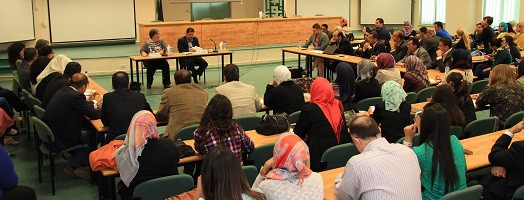Palestine’s Accession to International Treaties: Consequences and Next Steps
In addition to law students at Birzeit University, the event brought together members of the legal community, experts, and representatives of Palestinian line ministries, government bodies, and civil society actors.
Having welcomed the speaker and audience, Dr. Mustafa Mari introduced Ms. Mervat Rishmawi, human rights and international law expert. Dr. Mari noted that the legal encounter was significant particularly after Palestine has acceded to a number of international conventions. Accession reflects on Palestine both internally and externally. It gives rise to legal consequences on the Palestinian legal system. As public interest has not lived up to this remarkable event, the IoL has decided to organise this legal encounter to shed light on Palestine’s accession to international treaties. The presentation comprised two key components: (1) legal value of international treaties in relation to the legal framework in force in Palestine; and (2) procedures and steps Palestine should implement to benefit from the international conventions it has acceded to.
Rishmawi highlighted Palestinian experience in the fields of international law, international conventions, and approach to international community before and after recent accession. This is not new to Palestinians. A consideration of consequences should focus on Palestinian internal issues. Israel’s responsibility is established and is not affected by Palestine’s accession to international conventions.
In the second component of her presentation, Rishmawi addressed the legal value of international treaties in relation to the Palestinian legal framework. In light of absent explicit provisions on accession to international instruments, two approaches are in place: international treaties are either superior or inferior to domestic legislation. For example, some provisions of the Vienna Convention on the Law of Treaties establishes the status of treaties, considering them to be superior to domestic laws. This issue is both unclear and controversial, however. According to the Convention, Palestine will be bound to integrate provisions of the international conventions it accedes to within domestic regulations. The Vienna Convention prevents a state from invoking domestic laws to disavow international obligations.
Addressing required procedures and steps, Rishmawi elaborated on consequences of Palestine’s accession to international conventions. Two consequences are in place: national (internal) obligations, and international (external) obligations. The former stipulates that domestic legislation and procedures are aligned with international law. This obligation is of immediate effect following accession. It covers all three powers of the state. Therefore, decision makers should be aware of the content of conventions and the nature of obligations they give rise to. Effective legal and administrative tools and remedies will be created. These obligations place a burden on the State of Palestine. At the same time, they furnish an opportunity to enhance the legal legacy in Palestine. In light of a dysfunctional Palestinian Legislative Council, Rishmawi called on Palestine to launch a public debate, involving all civil society organisations and political actors.
External consequences provide for Palestine’s commitment to submitting a preliminary report and periodic reports on the issues addressed by the international conventions it has acceded to. Palestine will also report on human rights as well as on relevant administrative and legislative procedures it takes within the timeframe set by respective conventions. With the exception of ongoing Israeli infringements, including settlement activity, Rishmawi asserted that reports on these violations will cover encroachments committed after, not before, Palestine’s accession to the international treaties.
Like other countries, Rishmawi stressed that a Palestinian body should be established to coordinate with various human rights bodies as well as to submit reports to relevant agencies.
In the ensuing discussion, participants highlighted significance of Palestine’s accession to international treaties and relevant consequences. Discussants highlighted that these should be put to the best with a view to improve the Palestinian status.
The legal encounter was organised with support from Konrad Adenauer Stiftung.
Speakers
1. Mervat Rishmawi
2. Mustafa Mari
Venue
Institute of Law, Birzeit University
Date
2014-04-16











